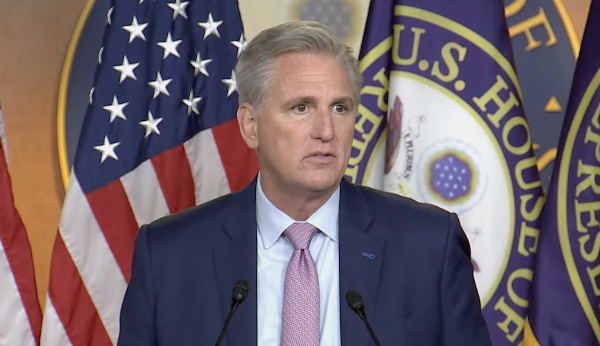To increase or not to increase: Republicans and Democrats clash over $31.4 trillion debt ceiling
01/18/2023 / By Belle Carter

Treasury Secretary Janet Yellen notified the country’s lawmakers last week that Congress needs to decide whether or not to proceed with the increase of the $31.4 trillion national debt limit.
According to Yellen, the U.S. will hit its cap on Thursday, January 19. Once that happens, she will not be able to issue new debt without congressional action. Wall Street economists were quick to warn of an imminent financial meltdown should the legislature fail to do something about it.
The debt ceiling, representing borrowing that the Department of the Treasury undertakes to fund its financial obligations, ranges from safety-net benefits such as social security payments to interest on the national debt, which is now about 100 percent of the Gross domestic product (GDP), up from 39.2 percent in 2008 and 77.6 percent in 2018. (Related: US national debt hits $31 TRILLION for the first time.)
Speaker Kevin McCarthy and President Joe Biden are said to be preparing for a showdown in their first major legislative clash since Republicans took control of the House. Yellen’s suggestion is to raise the debt limit as soon as possible to avoid a fiscal crisis. But it’s unclear whether lawmakers can reach a compromise to lift the ceiling.
“If lawmakers fail to come to an agreement, the debt ceiling debacle risks a self-inflicted recession,” Gregory Daco, EY Parthenon chief economist, said in a report. Chief global strategist at JPMorgan Funds David Kelly echoed the sentiment, saying this could lead to an “unmitigated disaster.”
McCarthy said his fellow Republicans will only agree to increase the debt ceiling in return for spending cuts. And a new rule that allows any lawmaker to trigger a vote for McCarthy’s removal could make even the most urgent of votes potentially unpredictable. “This is our moment to change the behavior,” McCarthy told Fox News Channel‘s “Hannity” on Tuesday, January 17.
Meanwhile, White House Press Secretary Karine Jean-Pierre said last week that there should be no negotiation over it. This is something that must get done, referring to the increase in the debt limit. She added that lawmakers in the past have increased the debt ceiling on a bipartisan basis. “It is one of the basic items that Congress has to deal with, and it should be done without condition,” she said.
Looking back, there has never been a time when America defaulted the debt limit – either Congress raised or suspended the limit when called upon to do so to avoid such a financial catastrophe. Because U.S. debt is considered the bedrock of the global financial system, due in part to its stability, a default could shake economies across the world.
“Americans could also face a recession, including higher unemployment, and the stock and bond markets would likely plunge. Recipients of federal benefits, such as social security recipients, might not get their monthly checks,” CBS News reported.
Meanwhile, the Republican speaker has not specified what needs to be cut in government spending. But his party is torn on whether to cut social programs or military spending, considering that the Biden administration gives Ukraine “extensive support.”
Yellen said she can keep the money flowing until June but urged the solons to “act in a timely matter” as there is “considerable uncertainty” around the forecast. But there were also talks that the secretary encouraged them to raise the limit after the November 2024 presidential election to remove it as an issue going through the campaign.
Treasury department to take “extraordinary measures”
As Yellen warned, Congress and the White House have roughly six months to avoid an unprecedented and potentially catastrophic default on the national debt. But the department basically leaves the executive and legislative federal branches with only one option – to increase its limit.
“‘Once the limit is reached, Treasury will need to start taking certain “extraordinary measures” to prevent the United States from defaulting on its obligations,” Yellen said in a letter to congressional leaders.
While buying time, the Treasury measures would include: (1) suspending sales of State and Local Government Series Treasury securities; (2) redeeming existing, and suspending new, investments of the Civil Service Retirement and Disability Fund and the Postal Service Retiree Health Benefits Fund; (3) suspending reinvestment of the Government Securities Investment Fund; and (4) suspending reinvestment of the Exchange Stabilization Fund.
Follow DebtBomb.news for more updates on the growing U.S. debt.
Watch the video below that talks about how the U.S. has reached its national debt limit.
This video is from the Galactic Storm channel on Brighteon.com.
More related stories:
US will default on national debt by October, warns Treasury secretary.
Sources include:
Submit a correction >>
Tagged Under:
big government, Collapse, Congress, debt bomb, debt bubble, debt collapse, democrats, economic collapse, federal debt, government debt, House, Janet Yellen, Joe Biden, Kevin McCarthy, money supply, national debt, national treasury, politics, Republicans
This article may contain statements that reflect the opinion of the author
RECENT NEWS & ARTICLES
COPYRIGHT © 2018 JUSTICEDEMOCRATS.NEWS
All content posted on this site is protected under Free Speech. JusticeDemocrats.news is not responsible for content written by contributing authors. The information on this site is provided for educational and entertainment purposes only. It is not intended as a substitute for professional advice of any kind. JusticeDemocrats.news assumes no responsibility for the use or misuse of this material. All trademarks, registered trademarks and service marks mentioned on this site are the property of their respective owners.




















